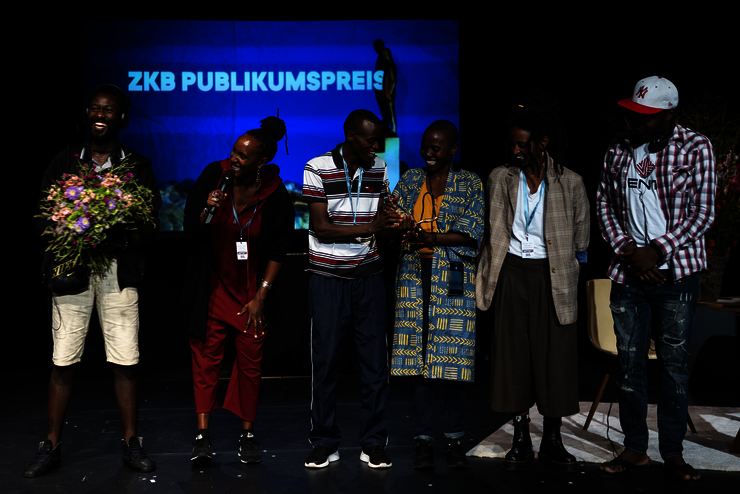The festival 2022: on, in and around water
The performance «What happens with a dead fish? (Lake Zurich Edition)» by Lithuanian artist Lina Lapelytė brought the 43rd Zürcher Theater Spektakel to a close on Sunday, 4 September. The work, created in collaboration with the Seefelder Kammerchor, is emblematic of some of the central concerns of this year's festival. This includes the cooperation of international artists with local performers, such as Meg Stuart's collaboration with The Field in «Waterworks». The work about transitions, indecisions and interactions referred not least to the excess and lack of water and thus to floods and droughts, which have become increasingly noticeable also in Central Europe in recent summers.
In general: water – as an element, resource and symbol of the increasing fragility of our world – was relevant and important for some of the works presented at this year's festival. These include the documentary play «Out of the Blue» by Silke Huysmans & Hannes Dereere about deep sea mining, or «Children of Amazi» by SMALL CITIZENS, a children's theatre about water scarcity in the Great African Lakes region, which won this year's ZKB Audience Award.
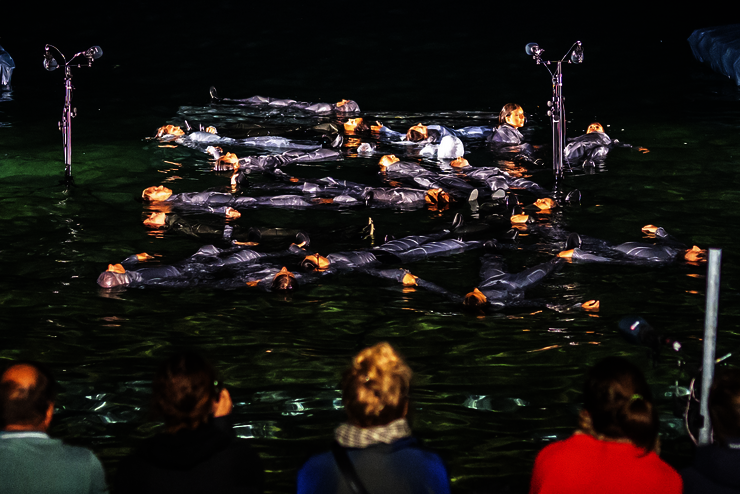
Co-productions and premieres: site-specific – and in between art and activism
Due to the reduced capacity of the various site-specific projects, fewer tickets were on offer for the first festival edition after the pandemic. Although advance sales were more hesitant than in the years before corona and there were fewer visitors to the Landiwiese, ticket sales were ultimately very successful again. With an occupancy rate of 85 percent, the festival and its programme have remained as popular as ever.
Our decision to use the Saffainsel for site-specific projects in different ways than before the pandemic not only created the space for projects like «Waterworks» and «What happens with a dead fish?», but also for the durational performance «Schmerz» by Ragnar Kjartansson with the participation of the musician Kristín Anna Valtýsdóttir and the comedian Saga Garðarsdóttir. Their minimalist reflection of a dramatic scene caught in a loop also inspired the critics: «The shock over an act of which you learn nothing slowly seeps into one’s awareness. You ponder over your own transgressions and increasingly accept the pathos as a matter of course – it is great,» Egbert Tholl wrote in the Süddeutsche Zeitung.
We were also pleased with the positive audience and press reactions to the works co-produced by the Zürcher Theater Spektakel, such as «Intimate Revolution» by Anna Papst & Mats Staub or «Please Stand» by Samara Hersch & Lara Thoms. Those and other works – some of which with the intention to become active and concrete about socio-political content – are not only of interest to us but also were also met with great interest by the audience. This was evident in the performance of Pussy Riot but also in the works from Latin America by Tiziano Cruz, Martha Luisa Hernández Cadenas and the Chilean collective LASTESIS. The relationship between activism and art and the exploration of its potentials remain a perspective we continue to pursue further – not least due to an intensification and vulgarisation of the public debate, which cultural institutions like us become increasingly aware of.
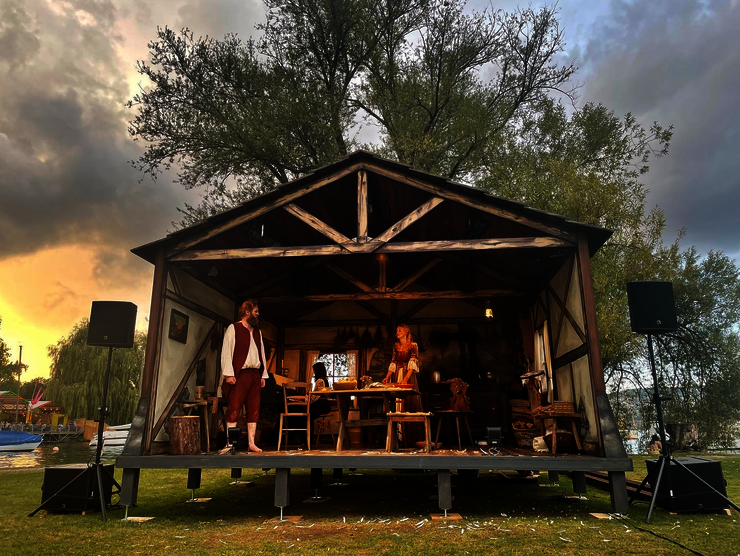
Festival gastronomy and street art: popular as ever
Following the last two pandemic-stricken editions, regular festival operations were finally possible again at the Zürcher Theater Spektakel 2022. This was evident in the simplified travel and production planning in the run-up to the festival, but also on site. Despite the reduction by two establishments, the festival gastronomy was well frequented this year, especially on the beautiful summer evenings. Finally, the whole culinary range from Agwaragwa to Thali to Spaghetti con le Sarde was available again – not to mention the delicious desserts!
The slightly different arrangement of the temporary buildings on the Landiwiese was intended to create more airiness and transparency, which according to the feedback of many visitors was a great success. A crowd puller on the festival site are and remain the Zentral stages, which were finally set up again following their new construction in 2019. They enjoyed great popularity both as a temporary home for street art and as an evening meeting place for artists and staff alike.
This year’s line-up of the Zentral once again displayed the whole gamut of contemporary forms of street art, but also music and spoken word, and, as a freely accessible offer, enthused hundreds of people of all ages every evening. On six days, street artists were once again touring the neighbourhoods and community centres within the city of Zurich.
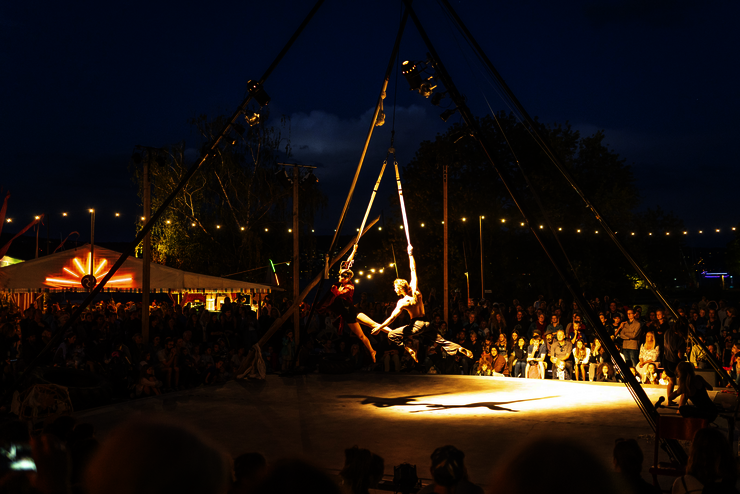
Co-operation, inclusion and diversity: On the way to a «Festival for Everyone»
Co-operations with institutions in the city of Zurich and international partners were once again continued and intensified – which not least contributes to a more sustainable cultural sector. Besides the aforementioned co-operations of international artists with local ensembles, the festival again collaborated with Theater Neumarkt and, for the first time, with the Museum Rietberg and the Luma Westbau.
In the context of our key objective «A Festival for Everyone», we equally intensified our efforts regarding exchange, diversity and inclusion. In the course of the past year, the festival direction and team have already dealt intensively with questions regarding a diversity-sensitive and discrimination-critical working culture. These questions were also addressed at various points in the festival programme, for example in the workshop «RESISTENCIA» with the Chilean collective LASTESIS, which resulted in a performance by around thirty women and queers from Zurich and the surrounding area on the Zentral stage. In addition to the popular format of the Stammtisch discussions, in which relevant topics related to the festival content are discussed in an open round, some innovations were also tested this year: the daily introductions to a performance, the use of simple language on the festival website or the info desk on the festival site were appreciated by the audience and encourage us to maintain and expand those offers.
Also present on the festival site were members of Theater HORA, who reflected their impressions of some performances in the form of short videos in a clever and entertaining way, as well as the fourth edition of radio workshops for young people and professionals with migration experience.
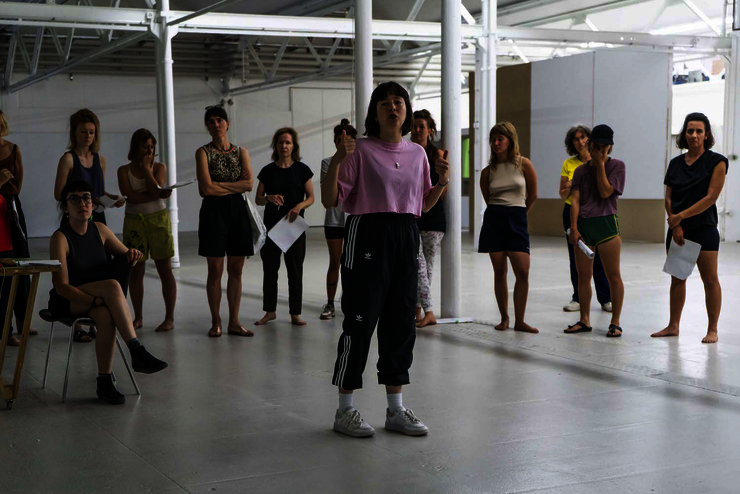
ZKB Prizes 2022: Intimacy, complexity, inter-culturalism
Last Saturday saw the award ceremony of the ZKB Prizes, with which the Zürcher Kantonalbank, one of the festival’s main partners, has been honouring artists performing at the Theater Spektakel for over twenty years. The ZKB Patronage Prize of CHF 30,000 was awarded to the Lebanese choreographer Ali Chahrour for the piece «The Love Behind My Eyes». The jury, consisting of Monika Truong, Nataly Sugnaux Hernandez, Nedjma Hadj Benchelabi, Yoko Kawasaki and Eva Neklyaeva, based their decision in particular on the careful and masterly composition of space, light and music underlining the radical gentleness of the gestures in the piece. The jury was also impressed by the fact that «The Love Behind My Eyes» was developed in Beirut during the covid pandemic and other severe crises. «Against this backdrop, the piece insists on intimacy, personal stories and embodied knowledge while at the same time addressing a wider range of collective social issues», the jury stated.
The ZKB Acknowledgment Prize of CHF 5000 went to the Cuban performer Martha Luisa Hernández Cadenas. According to the jury, her piece «No soy unicorno» is rich in poetry and concrete images from the socio-cultural context of Havana. «The generosity, thoughtfulness and fluidity of her performance, as well as the freedom with which she assembles and disassembles meanings and media, reflect a multi-layered subject matter», the jury further emphasised in its statement.
The festival audiences were particularly enthusiastic about «The Children of Amazi» this year. The piece is the result of the initiative SMALL CITIZENS, a co-production of the Ishyo Arts Centre in Rwanda and the Théâtre du Papyrus in Belgium. The aim of the initiative is to rethink and realise young theatre in East Africa in an intercultural way.
We conclude this report with a THANK YOU that actually comes first and foremost: to our staff for their huge commitment every year, to our partners for their encouragement and support, and especially to our alert, open, critical and enthusiastic audience. Once again, we are greatly indebted to all of them.
We look forward to seeing you again next year on the Landiwiese.
The festival direction
Matthias von Hartz, Sarah Wendle, Veit Kälin
